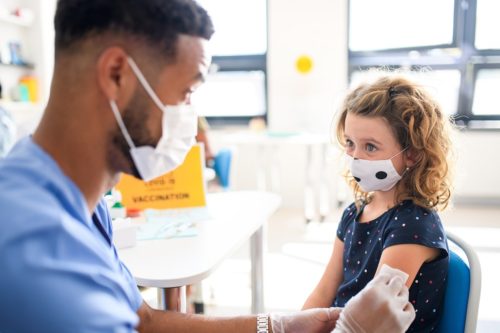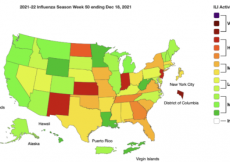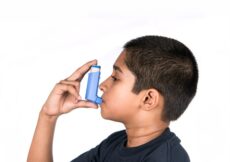May 24th, 2022
As the numbers of COVID-19 cases and hospitalizations trend upward throughout the United States, parents received good news last week when the FDA approved a booster dose of the Pfizer vaccine for kids 5-11 years old.
Vaccine uptake in children has been slow. First available in November 2021, only 29% of children ages 5-11 have completed a 2-dose series of the Pfizer vaccine. Teenagers, on the other hand, have had a year of choosing between either the Moderna and Pfizer vaccine, and they have done considerably better; 59% of 12-17-year-olds have received 2 jabs.
If it’s been at least 5 months since the second vaccine was administered, Melissa Jenco makes the case that now is the time to consider getting them a booster shot:
A booster dose for this age group is 10 micrograms, the same as the dosage in the primary series. It is one-third of the adolescent and adult dose.
“While it has largely been the case that COVID-19 tends to be less severe in children than adults, the omicron wave has seen more kids getting sick with the disease and being hospitalized, and children may also experience longer term effects, even following initially mild disease,” FDA Commissioner Robert M. Califf, M.D., said in a news release. “… Vaccination continues to be the most effective way to prevent COVID-19 and its severe consequences, and it is safe.”
Citing data showing declining immunity after just 2 doses of the vaccine, leaving children (and adults) with little protection against the Omicron variant, the CDC agreed overwhelmingly with FDA’s recommendation and gave pediatric medical providers the green light to give boosters to their patients. Studies show that a third dose provides considerably more protection than 2 doses against the pandemic virus that has sickened millions of young children, resulting in 15,000 hospitalizations and 180 deaths in kids between the ages of 5 and 11.
For immunocompromised children, Apoorva Mandavilli says this will be the fourth dose that’s been authorized for their use:
“Vaccination with a primary series among this age group has lagged behind other age groups, leaving them vulnerable to serious illness,” Dr. Rochelle Walensky, director of the C.D.C., said.
“With over 18 million doses administered in this age group, we know that these vaccines are safe, and we must continue to increase the number of children who are protected.”
A booster dose will offer children an extra layer of protection at a time when infections and hospitalizations are once again rising nationally, scientific advisers to the agency concluded at a meeting on Thursday.
Mandavilli reminds us that nearly three-quarters of American children have evidence of prior infection with SARS-CoV-2 that resulted in some level of natural immunity. How much is the question:
But some evidence suggests that compared with vaccination, protection following an Omicron infection may be weaker and may not last as long.
“Prior infection can result in protection against reinfection for a time period, but it’s not 100 percent and likely decreases over time,” Dr. Oliver said.
What is a mild respiratory illness for some can be a pretty devastating multisystem disease for others. Children and adults living with underlying health conditions (obesity, diabetes, chronic heart and lung diseases, and immunosuppression are the biggest risks), the elderly, members of minority communities, and people living in poverty with limited access to health care resources face the highest risks of becoming infected, developing complications, and dying from COVID-19. However, remaining unvaccinated is an unforced error in judgement during a deadly global pandemic; with more than a million fellow Americans dead, there really isn’t any excuse for refusing to get vaccinated and boosted.
The school year is coming to a close and summertime checkup season just around the corner. Today is the best time for parents to schedule their kids’ annual visits with the pediatrician and make sure they are up-to-date on all their immunizations, including the now-three shot series of COVID-19 vaccine.




































